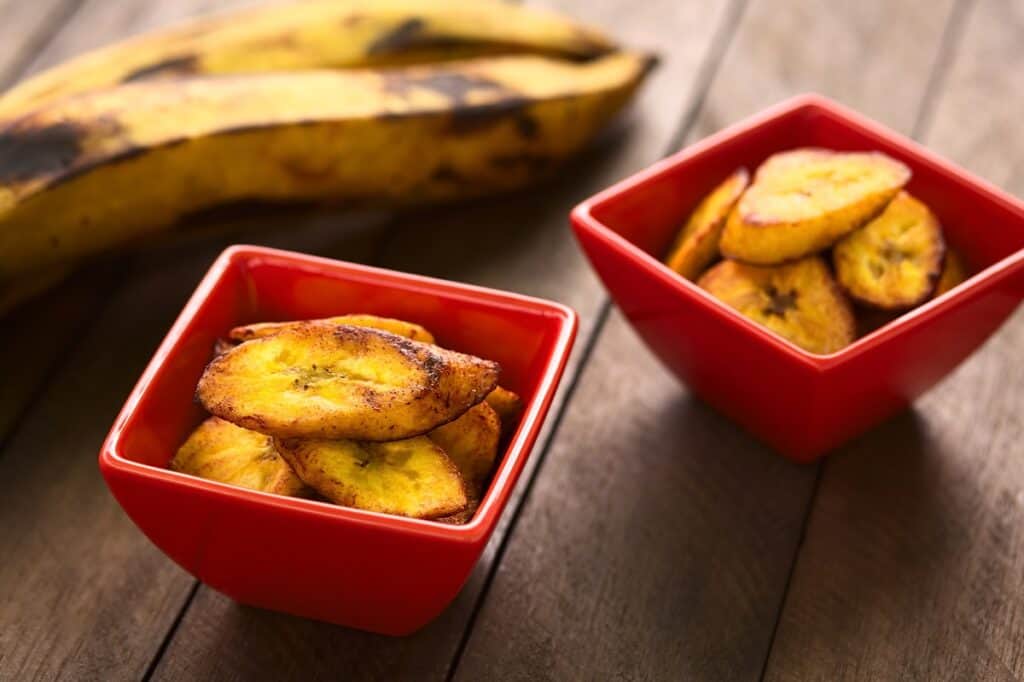Plantains are a starchy fruit that are a staple food in many tropical regions – but of course, they’re enjoyed by many here in the United States too. If your pup just snagged one for a snack, you may be wondering – can dogs eat plantains? Rest assured, plantains are safe for dogs to eat. However, you should always be mindful of the risks and benefits associated with feeding your pup plantains before proceeding.
This post was reviewed for veterinary accuracy by Cara Wright, DVM. For more information about our review process, please visit the About Us page. This article is for informational purposes only and should not be a substitute for professional veterinary help.
Benefits of Plantains for Dogs
Even though plantains may be an unconventional addition to your dog’s diet, they have some potential benefits:
Contain fiber.
Each medium plantain contains just over 4 grams of fiber. According to Cummings Veterinary Medicine Center at Tufts University, fiber can promote overall digestive health and good gut bacteria in your pup. That fiber in plantains can help bulk up your dog’s stool to keep things moving along so Fido doesn’t get constipated. Other foods that may help with this include pumpkin and spaghetti squash.
That said, if your dog struggles with chronic constipation, it is best to discuss these issues with your veterinarian. A supplemental fiber product may be a better choice to help your dog get on a regular bathroom schedule.
Furthermore, if your pet has diarrhea, you should avoid giving them plantains as it may exacerbate that issue.
Rich in potassium.
Plantains are a great source of potassium, a natural electrolyte, which is essential for muscle health and nerve health in both humans and dogs alike. A single plantain provides about 1310 mg of potassium, according to the USDA. Including potassium in your dog’s balanced diet can help support overall health and wellness.
Potassium deficiency can lead to muscle weakness and lethargy in dogs – however, if you suspect your dog has a potassium deficiency, do not try to treat this with food like plantains. Potassium deficiency is often indicative of a severe medical issue, so be sure to contact your vet right away if you notice those symptoms.
Rich in Vitamins A and C.
Another benefit is that plantains are rich in vitamins C and A. Interestingly, though, dogs are actually capable of meeting their Vitamin C requirements through their own body’s production (unlike humans).
However, dogs do need to make sure they get Vitamin A in their diet to maintain their health. In the absence of it, dogs may suffer from skin problems, changes to their coat, and night blindness. Plantains can be an easy way to get extra Vitamin A in your dog’s diet.
Keep in mind though that too much Vitamin A can also lead to problems. According to VCA, Vitamin A toxicity can occur in dogs fed primarily high-Vitamin-A table scraps, and may cause a form of arthritis. While this is generally linked to high consumption of organ meats, if this occurs, it’s wise to stop feeding your dog plantains for the time being.

Risks of Plantains for Dogs
While it may sound like a good idea, there are also some potential risks associated with feeding your dog this type of fruit:
Digestive Upset
Consuming too many plantains can cause digestive upset and diarrhea. Dogs may be more likely to have digestive upset after raw plantains compared to cooked plantains. If you notice your dog is having excessive bloating, stomach upset, or diarrhea, stop feeding your dog plantains.
Avoid if your dog has hyperkalemia
Hyperkalemia, otherwise known as high blood potassium, is a rare but serious medical condition in dogs sometimes related to renal problems. If your dog has been diagnosed with hyperkalemia, avoid serving them high-potassium foods like plantains until the condition has been addressed.
Use caution in dogs with diabetes.
If your pup is diabetic and you are considering feeding them plantains, it’s important to note that too many fruits may aggravate the condition. Plantains are high in starch and sugar, which could cause spikes in blood sugar levels – however, the fiber in plantains does help slow the blood sugar response. Ultimately, ask your vet whether it’s OK to include plantains if your dog has diabetes.
How to Serve Plantains to Dogs
Serve plantains in moderation – you don’t want to crowd out the other important foods in a dog’s diet, particularly high-quality protein.
Avoid serving them raw, as they are fairly starchy and less palatable that way, and may cause digestive upset. They’re best served to your dog boiled, steamed, or baked.
To bake a plantain, use a sharp knife to cut a shallow line down the center of the plantain. Place on a baking sheet and bake at 400 degrees for about 20-25 minutes, until soft. This is a great way to serve them as there’s no added oil or sugar.
Plantains are also tasty when boiled, mashed, and mixed with peanut butter. This can create an applesauce-like consistency that’s perfect for dogs who have chewing difficulties.
Avoid serving fried plantains, as too much oil may upset your pup’s stomach. You should also avoid commercially prepared plantain chips, which are typically high in unhealthy fats and may also have seasonings that are unsafe for your pup.
Plantains =/= Plantain Lily
Sometimes people get confused about the safety of plantains, because of a similar named plant called plantain lily. While plantains are safe for dogs, plantain lily, also known as Hosta, is not. According to the ASPCA, it contains saponins that can cause vomiting, diarrhea, and depression if ingested.
If you have plantain lily growing in your yard, keep your dog away from it. But rest assured that this is a completely different type of plant than a plantain fruit.
A Final Word
As you can see, serving your dog a plantain here or there should be fine, and may even have a few benefits. However, do not serve your dog too many plantains (or other table food) which can crowd out more important foods and nutrients. If in doubt about any symptoms your dog is experiencing, consult your veterinarian.

